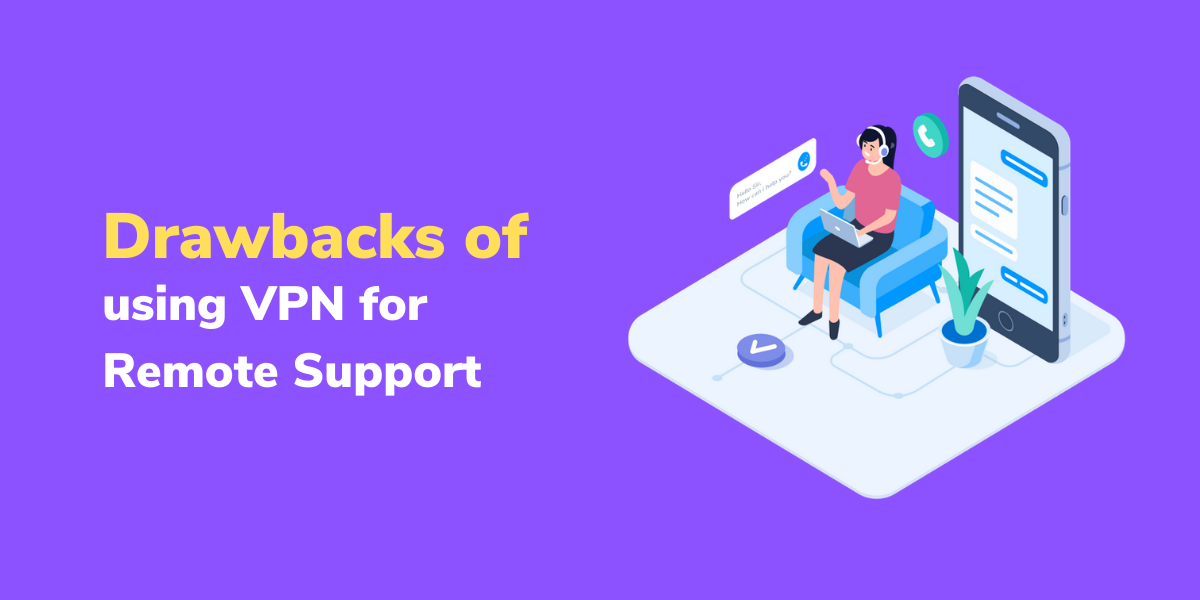In our last article, we covered a few best practices for supporting customers remotely. We also touched upon how using a VPN to enable remote working for support/sales agents can hamper customer service.
Remote customer support is the need of the hour, and there’s a high chance that you must be considering VPN to make use of your on-premise call center system remotely. But while the solution looks straight forward it’s not all that simple. There are many disadvantages to the solution, and that’s what we’ll cover in this article.
Current Scenario
Currently, organisations are left with no option than to embrace cloud telephony platforms like Exotel or use a VPN setup to facilitate remote customer support.
If you’re using or planning to use VPN to solve the remote problem you should reconsider your decision and here’s why :
1. High IT costs
Setting up VPN clients for agents working from home is not so easy. You need to spend both resources and time to make it work for them. This will vary depending upon the number of agents in your team. To get a better picture, you can calculate the –
1. Cost of the VPN client * number of agents
2. Time spent to set up the client for agents
If your agents were working on desktops before, you’ll need to equip them with portable systems and other accessories to enable them to work from home, adding to your costs.
2. Reliability and Voice Quality
There’s a huge difference when you compare residential internet with the one at your workplace. Residential internet connections have restrictive bandwidth and won’t guarantee the same service or uptimes that come with the latter.
Since all the support/sales calls are over the internet, the quality directly depends upon the agent’s internet connection. Some of the common problems they are ought to face are power cuts and bandwidth fluctuations. This directly affects the quality of your customer service. One missed or delayed call is enough to disgruntle a customer.
Even though your agents might be trying their best to support customers, the unreliability of the solution can make their efforts go in vain, tarnishing your brand.
Solution
Unlike on-premise systems, using our platform, agents can manage calls right on their phone. Since all the calls are over the PSTN network, there’s no dependency on the internet.

Comparison between Cloud Telephony vs EPABX
3. Scalability
Companies have been using VPN setups for support even before the pandemic. This was done mostly to support remote agents working across the globe, who account for only 5-10% of their complete workforce. But moving 100% of your support agents to a VPN setup can pose a high risk. This is because the setup was never meant to support so many agents at the same time.
To make things ready for such a scale, you’ll have to spend a lot on upgrading your infrastructure. Even then, it doesn’t guarantee whether the setup will work as planned or not; it can go both ways.
4. Future Proofing
A few months back, nobody thought the pandemic would leave businesses stranded like they are today. In fact, most businesses weren’t prepared to tackle the current situation, both digitally and financially. On the digital side, the pandemic has played a huge role in accelerating digital transformation at a lot of organisations.
We saw the same trend for customer communication. A lot of companies moved their communication to the cloud in order to support remote working for agents. While one cannot ignore the investments made in the legacy communication systems, the advantages, and reliability of the cloud systems make it a better choice in the long-term future.
Solution
Using a cloud telephony platform is the smartest way you can manage phone calls easily and economically, without compromising on quality. So you can either invest your money on an outdated and unreliable VPN solution (which will last for a few months) or future proof your communication by embracing cloud telephony. We’ll leave that decision upon you.
Conclusion
We know that making a decision as big as switching communication platforms under current circumstances is difficult. It can be tempting to use an alternative method such as the VPN setup to ensure business continuity.
But honestly, a pandemic is as good a time as any to switch over to cloud telephony. We all know the future is in the cloud.
Regardless, if you’re struggling to manage your remote support team, feel free to download our in-depth ebook to smoothen your remote transition.
Stay Safe!

Moving your business communication to the Cloud
Businesses often move to cloud communication system to save on operational costs. However, that is not the only benefit of moving to the cloud. We wrote down the other direct and indirect advantages of moving your business communication to the cloud in this white paper.




 +91-8088919888
+91-8088919888 +1-(718) 354-8866
+1-(718) 354-8866 +61-2-8073-0559
+61-2-8073-0559 +62-215-098-4960
+62-215-098-4960 +60-3-2771-2799
+60-3-2771-2799 +65-6951-5460
+65-6951-5460 +66-2-4915099
+66-2-4915099